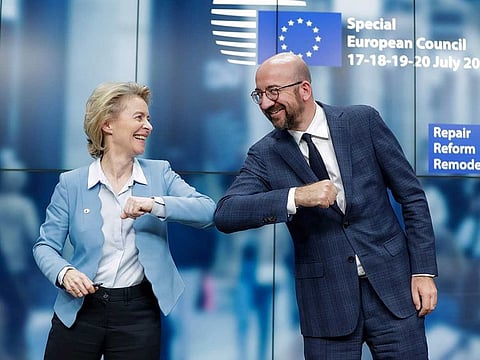EU leaders reach historic deal
Huge economic package reboots European economy after coronavirus

The word ‘historic’ is being applied to a massive stimulus plan reached between the 27 heads of the European Union nations — a deal that will see €1.8 trillion (Dh7.56 trillion) used to reboot and re-engineer recovery and growth in the world’s third-largest economy.
In this time of social distancing and a coronavirus that remains stubbornly resilient against public health containment measures, there were no actual handshakes to mark reaching the economic rescue package and new six-year budget between the 27 and top EU officials — elbow bumps and smiles through masks had to suffice.
But the deal was hard forged, taking almost five days of marathon discussions and at times acrimonious negotiations to reach.
If there is one thing we know now after both the Brexit process and other contentious issues, the EU does manage to reach agreement — even if it takes a long time to do so. Compromise again won through on this occasion, with the EU leaders agreeing to €390 billion in grants but with strings attachedGulf News
At times, the rift between the four so-called nations led by the Netherlands along with Austria, Denmark and Sweden seemed unbridgeable, with President Emmanuel Macron of France and German Chancellor Angela Merkel consistently making the case for the need for agreement on a wide-ranging and deep stimulus package.
Hit by the coronavirus pandemic
While the initial proposal offered €500 billion in non-repayable grants and more than €250 billion in repayable loans, the frugals wanted less money handed out in grants and more in loans — a stance that would punish the economies of Italy and Spain, both hardest hit by the coronavirus pandemic.
If there is one thing we know now after both the Brexit process and other contentious issues, the EU does manage to reach agreement — even if it takes a long time to do so.
Compromise again won through on this occasion, with the EU leaders agreeing to €390 billion in grants but with strings attached. It’s a compromise the four could live with.
The initial economic proposal also attempted to link financial stimulus with conditions that underlined the importance of the democratic principles of the EU.
That tie-in was aimed at punishing both Hungary and Poland for undermining press and personal freedoms and linking the administration of justice to elected governmental positions.
EU leaders reluctantly agreed to sideline the issue of linking the two, though they will address the Polish and Hungarian alleged transgressions, probably under the current rotating leadership of Germany before the end of the year.
In attempting to reach an agreement, leaders also watered down environmental clauses that linked specific funding to reaching specific climate control targets — but that too will be addressed separately.
While not perfect, the EU deal does press reset on Europe’s economy — and that benefits the global picture too.



